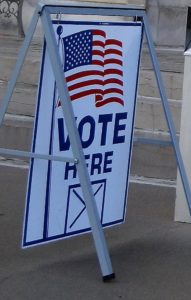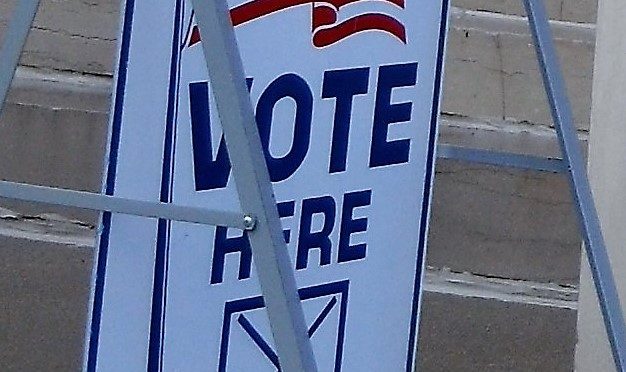
In three weeks voters will be electing government representation.
In addition, there will be a question to consider on the ballot.
In the November 5, 2019, General Election you will be asked to approve removing a census count adjustment.
“The amendment question seeks to do away with a census count specifically for college students and military personnel to be counted where they come from and not where they are at the time of their vote,” according to a report on KSN TV, Wichita, Oct. 14, 2019. For the whole report click below:
https://www.ksn.com/video/constitutional-amendment-for-census-change-on-november-ballot/
Following is how the amendment will appear on the ballot, followed by the Kansas Secretary of State Scott Schwab’s explanation of the question.
This is how it will read:
Constitutional Amendment
Vote Yes or No
Explanatory statement. The
purpose of this amendment is to
eliminate the adjustment of
the census taken by the United
States census bureau regarding
nonresident military personnel
and nonresident students when
reapportioning the Kansas senate
and house of representatives.
A vote for this proposition would
eliminate the adjustment of
the census taken by the United
States census bureau regarding
nonresident military personnel
and nonresident students when
reapportioning the Kansas senate
and house of representatives.
A vote against this proposition
would continue in effect the
requirement for the adjustment of
the census taken by the United
States census bureau regarding
nonresident military personnel
and nonresident students when
reapportioning the Kansas senate
and house of representatives.
Shall the following be adopted?
- 1. Reapportionment of
senatorial and representative
districts. (a) At its regular session
in 1989, the legislature shall by
law reapportion the state
representative districts, the state
senatorial districts or both the
state representative and
senatorial districts upon the basis
of the latest census of the
inhabitants of the state taken by
the authority of chapter 61 of the
1987 Session Laws of Kansas. At
its regular session in 1992, and at
its regular session every tenth
year thereafter, the legislature
shall by law reapportion the state
senatorial districts and
representative districts on the
basis of the population of the
state as established by the most
recent census of population taken
and published by the United
States census bureau of the
census. Senatorial and
representative districts shall be
reapportioned upon the basis of
the population of the state
adjusted: (1) To exclude
nonresident military personnel
stationed within the state and
nonresident students attending
colleges and universities within
the state; and (2) to include
military personnel stationed within
the state who are residents of the
state and students attending
colleges and universities within
the state who are residents of the
state in the district of their
permanent residence. Bills
reapportioning legislative districts
shall be published in the Kansas
register immediately upon final
passage and shall be effective for
the next following election of
legislators and thereafter until
again reapportioned.
(b) Within 15 days after the
publication of an act
reapportioning the legislative
districts within the time specified
in (a), the attorney general shall
petition the supreme court of the
state to determine the validity
thereof. The supreme court,
within 30 days from the filing of
the petition, shall enter its
judgment. Should the supreme
court determine that the
reapportionment statute is invalid,
the legislature shall enact a
statute of reapportionment
conforming to the judgment of the
supreme court within 15 days.
(c) Upon enactment of a
reapportionment to conform with
a judgment under (b), the
attorney general shall apply to the
supreme court of the state to
determine the validity thereof.
The supreme court, within 10
days from the filing of such
application, shall enter its
judgment. Should the supreme
court determine that the
reapportionment statute is invalid,
the legislature shall again enact a
statute reapportioning the
legislative districts in compliance
with the direction of and
conforming to the mandate of the
supreme court within 15 days
after entry thereof.
(d) Whenever a petition or
application is filed under this
section, the supreme court, in
accordance with its rules, shall
permit interested persons to
present their views.
(e) A judgment of the supreme
court of the state determining a
reapportionment to be valid shall
be final until the legislative
districts are again reapportioned
in accordance herewith.
KEY POINTS
The following is provided by Bourbon County Clerk Kendell Mason, who sent info from the Kansas Secretary of State to explain the amendment.
- Kansas is the only state in the nation that adjusts its census numbers.
- Adjustment is estimated to cost $835,000 in 2020.
- In the 2010 adjustment, approximately 13,000 people, out of 2.9 million, were affected.
- Eliminating the adjustment would give lawmakers an additional legislative session to complete redistricting.
- Legislative and State Board of Education districts would be drawn using the same numbers as congressional districts.
- The Legislature supported eliminating the adjustment with bi-partisan super majorities.
Summary:
A Proposition to amend section 1 of article 10 of the constitution of the state of Kansas.
In 2019, the Legislature passed a constitutional amendment (SCR1605) with a bipartisan super majority to eliminate a provision in the Kansas Constitution requiring Kansas to adjust census numbers for military personnel and college students. Intended to slow the impact of urban migration from rural Kansas to the more populated, eastern half of the state, the requirement has, historically, had the opposite effect by marginally increasing population numbers for urban areas.
The adjustment is antiquated, burdensome and expensive because it requires the Secretary of State’s office to contact every college student and member of the military residing in Kansas to determine their official residence. Keep in mind, the U.S. Census Bureau is responsible for counting individuals where they reside in the United States. They expend significant resources in communicating with Americans on the importance of the Census. Kansas is essentially asking students and military personnel the same question – at a cost of at least $835,000 – in a manner contradictory to what is asked by the Census Bureau.
